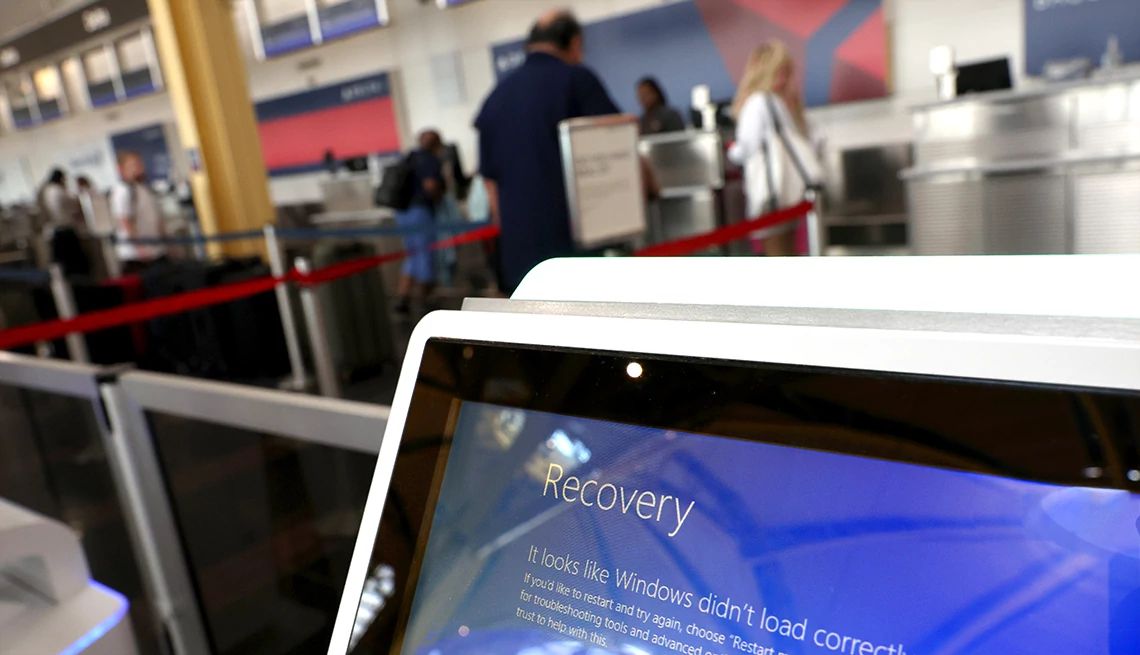
- Select a language for the TTS:
- UK English Female
- UK English Male
- US English Female
- US English Male
- Australian Female
- Australian Male
- Language selected: (auto detect) - EN
Play all audios:
July 19’s massive global tech outage that paralyzed airlines, financial institutions, media outlets, health care systems and even the Paris Olympics left many older adults fretting about
what was happening and, more importantly, what to do next about their travel, doctor’s appointments and banking. Some summer vacation plans were grounded. Scheduled medical treatments were
suddenly postponed. Windows computers displayed the dreaded “blue screen of death,” signifying a system crash, or files in Microsoft’s cloud were unreachable. The outage was traced to a
faulty Microsoft Windows update from CrowdStrike, whose cybersecurity software is widely employed by businesses to thwart hackers. About 8.5 million Windows computers were directly affected
in the CrowdStrike update, less than 1 percent of all Windows devices, Microsoft says. In general home PC owners didn't have problems connecting to the internet because CrowdStrike
mainly works with large businesses.“This is not a security incident or cyberattack,” CrowdStrike CEO George Kurtz posted on social media. A “fix has been deployed.” Meanwhile, criminals
were stepping in to take advantage of the chaos, and questions persist. “Scammers will contact people pretending to be doing a good deed and pretending to be your computer company and
saying, ‘Hey, you heard about CrowdStrike. We can help you,’ ” says Amy Nofziger, AARP’s director of fraud victim support. Ignore it all: phone numbers that might pop up on your screen and
phone calls you didn’t ask for. Nofziger advised to shut off computers and hang up phones, saying above all, don’t let them panic you. They want your frenzy to make you act before you
can think, and they likely will ask you for remote access to your computer — a red flag. Here’s a look at how things played out and what older adults can do if they have future problems.
THOUSANDS OF TRAVELERS GROUNDED, DELAYED IN HECTIC SEASON NEED TECH SUPPORT? The tech outage hit airlines during a busy summer travel season and thousands of flights were canceled or delayed
worldwide. More than 8,300 flights were delayed and more than 2,500 flights canceled into or out of the United States. Delta Airlines, United Airlines and American Airlines were leading
in the number of cancellations. Travelers saw long lines at ticket counters because check-ins were slowed or stopped, according to the Associated Press. Airports and airlines in the U.S.,
Australia, Europe and India reported problems with grounded flights. By midmorning, some systems were back online. Delta Airlines resumed some flights and issued waivers for customers. It
recommended consumers use the Delta app or visit a website to manage their flights. Many airlines, including American, Spirit and United, issued waivers to help passengers make new
arrangements. The U.S. Department of Transportation tweeted, FlightRights.gov was available to navigate what the airlines’ responsibilities were.



